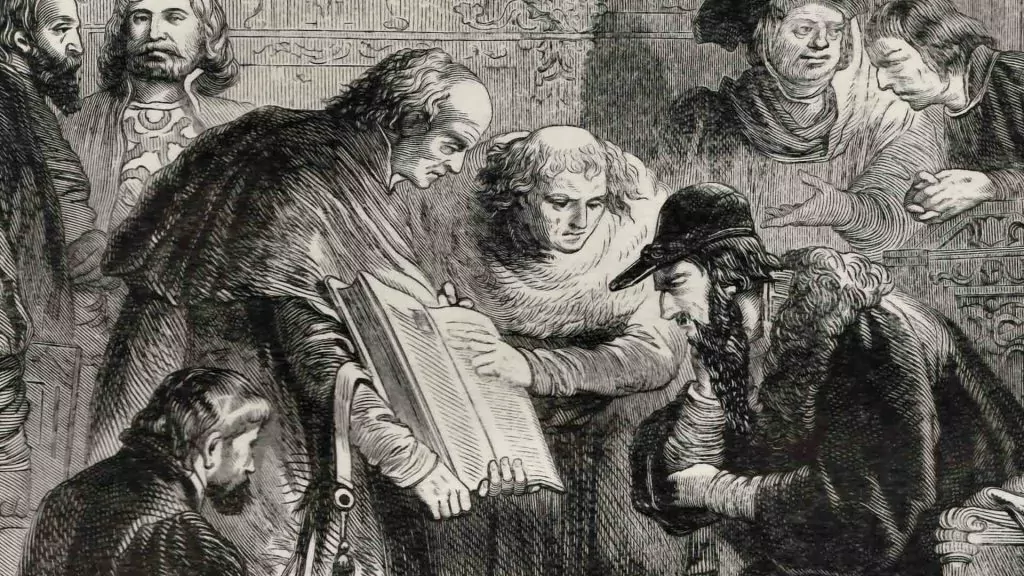What I am going to tell you is pure fantasy, but it might be useful to pause a moment because it can teach us something.
It was some years after our Lord and Savior had risen from the dead, and the congregation of Jerusalem had already become quite large. One evening there was a meeting, held with the elders of the congregation, and as was usual, also the apostles who were resident in Jerusalem. Even though it was a dangerous time, and the enemies were keeping a sharp lookout, the brothers had gathered from all parts of the city. No one was absent when the chairman, James, the brother of the Lord, opened the meeting.
The matter to be discussed that evening was of vital importance, hence the full attendance. In those days none of the four gospels, as we know them, had yet been written, but various accounts of events that had occurred during the Master’s time on earth had been recorded. These included accounts of miracles He had performed, accounts of discussions He had held with the young men and accounts also of some of His speeches both at Jerusalem as well as in Galilee. At that time, they were still short, loose notes; they had not yet been put together into one book. It stands to reason that these written accounts were extremely valuable to the congregation. They were eagerly read by the members in the city and they were even beginning to be distributed outside Jerusalem. They were also starting to be used during the worship service, here and there.
Well, the issue, the question that was before the meeting of the elders and apostles this evening, concerned these loose notes. The question was, should these bundles of loose notes be accepted as trustworthy reports of what had taken place and could they be recommended for use in the worship services.
All present appreciated the importance of the decision that had to be made. If these accounts were officially accepted and openly used then they would spread far and wide, and give direction to the life of the congregations.
After the chairman opened the meeting with prayer, he outlined the great importance of the decision that had to be made and then asked if any of the elders or apostles had any objection to the written accounts in circulation. They were all amazed that it was Philip who requested the floor first of all.
“If you ask me if I have objections,” he said, “then I can only say that the notes before us are totally trustworthy. I have not found anything in them that has not really happened.
“Another question to ask, though, is whether it is desirable to use them in this form. Is it really necessary, brothers, that in these writings there is such extensive attention paid to how Peter, more than once, did deeply grieve the Master? I think of the occurrence, also related in these writings, when they were going to Caesarea Philippi. The Master turned round and said to Peter, ‘Get behind me, Satan!’
“I know that is what happened. I was there myself and I heard what was said, but I have to ask, is it really wise to air this happening for all and sundry? I think of that terrible night when Jesus was condemned and how Peter denied Him three times. It is true, it did happen, but again I ask myself is it really necessary to air these things openly? We here in Jerusalem, we know Peter and have a high regard for him, but if these papers spread to other countries where they have never seen Peter, wouldn’t this give an entirely wrong impression of Peter? Aren’t these really matters of an intimate nature, which concern only Peter in his relationship with the Savior? Considering how well everything has turned out, shouldn’t we just forget what happened in the past?”
When Phillip finished speaking those present couldn’t help but look in the direction of Peter. They expected Peter to jump to his feet and say something. But that didn’t happen. Peter sat silent, frowning and looking at the table, and not saying a word. The sides of his mouth trembled, and from the way he held his hands, with his white knuckles showing, it was clear that he was extremely moved and was involved in a severe internal struggle. For some moments everyone in the meeting was absolutely silent. Not one of the apostles spoke.
In the end it was one of the elders of the congregation who broke the silence. “I am entirely in agreement,” he said, “with the previous speaker. I would like to go even further. I have noticed in all the writings the apostles really play a rather sad role. It repeatedly says that they did not understand the Master. It is told once, when they came back from the north to Capernaum, that they had a serious tiff between themselves about who was the greatest among them. It is written that, even in the Passover room, when the Master instituted the Holy Supper, the apostles were at loggerheads about who should take the place of honor. The story is also told of how three of the apostles, our beloved Peter, James and John, were asleep in that terrible moment when our Savior fought His most bitter struggle in Gethsemane.
“Is all this necessary, do we really want to broadcast this throughout the world?
“Won’t this cause a lack of respect, which we all owe, to our office bearers? Can we really expect that the people who will read this, who will see how the first disciples often didn’t acted as faithful servants of the Master, can we really expect that they will have great reverence for the founders of the Church? Is it not rather to be feared that such stories will lead to damage in the congregations? I ask myself would it not be wiser if we kept all such stories to ourselves and didn’t to pass them on to others.”
Again it was one of the apostles who now began to speak. He also judged that there was a dangerous aspect to such stories. He reminded his listeners that one of the accounts related that the brothers of Jesus did not believe in Him and that they were even at enmity with Him. “Is it right,” he asked, “to broadcast this story? We all know that the chairman of this meeting, James, the brother of the Lord, also belonged to them, but that after the resurrection he repented. Does his dark past have to be revealed to all eyes? Might that not lead, in time, to a deterioration of the relationships within the congregation?”
When this third speaker had finished there was a painful silence in the meeting. One could feel that most of those present labored under a great strain.
The chairman who otherwise was quick to encourage the members to deal speedily with the matters at hand now sat silent. It was obvious that he also had a struggle within himself.
The silence lasted for some minutes.
It came as a great relief when finally Peter stood up and started speaking. It was clear he was extremely moved; while he spoke he time and again had to hold the table, as if he needed its support. The words that he spoke came as if pushed from the deepest part of his heart.
“Brothers,” he spoke, “humanly speaking I am thankful for all that has been said this evening, but I also realize, that these words are at the same time a dangerous temptation for me. It is true that years ago the Master once said to me, ‘Get behind me, Satan.’ I, therefore, feel that tonight I must say it myself, ‘Get behind me, Satan.’ How could I ever make my Master great if I am not prepared to make myself thoroughly small? How could we apostles ever proclaim the glory of Jesus Christ throughout the world, if we did not at the same time tell of all our foolishness and cowardice and all our egotistical and self-seeking deeds and thoughts with which we made the suffering of the Master so much heavier? Only in that way can our message become the Gospel, the happy tiding for the people of all nations and of all ages. Then they will see that we, the young men of the Master, are just as weak, dumb and self-seeking as they are themselves, and that we are only what we are today because He with His love surrounded us.
“You ask me, if by these stories the respect for the office will not suffer? That could well be so, if the respect for the office depended on our status as great men. But the glory of the office does not lie therein that we are great, but that the Master, who had mercy over us, is so great.
“When I remember how the Savior told us that this Gospel should be preached to all people, then I know that gospel should also include how I with my self-conceit often deeply hurt my Lord. It should include how we, young men, often argued among ourselves as little children about the place of honor, that we slept when He struggled His fight to the death, and that I, in a terrible way, three times denied Him. That should all be included, but this one thing more should also be included that the Master said: ‘On this petra I will build My church, tend my sheep.’
“Though there is nothing nice to say about us, nevertheless we may do something, we may serve in God’s Church, and that is only because He never for a moment abandoned us and prayed for us right to the end. Brothers, let us not hesitate for a moment, but let this Gospel, as it lies before us be distributed throughout the ages to all the people in this world. Then we diminish, but He is made all the greater”.
When Peter had finished speaking a deep holy peace descended on the whole meeting. The chairman, who for the whole time had just stared straight ahead, looked up. “Brothers,” he asked, “shall we act as proposed?”
And although not one of those present answered aloud, it was more than clear that this word was agreeable to all.
And so these loose papers were distributed, later they became the Gospels as we have them today.
Dr. J.H. Bavinck (1895-1964) was a Dutch minister, missionary, and theologian. This article first appeared in the October 1999 issue of Reformed Perspective under the title”The birth of the Gospel.” It has been translated by Rene Vermeulen and is reprinted with permission from 15 Paasverhalen, no 18 Zaklantaarnserie, published by Voorhoeve/Kok, Kampen, The Netherlands.















